Investing in mobile home parks offers a unique opportunity for generating steady cash flow.
As housing costs rise, mobile home parks present an affordable living option for many, making them an attractive choice for investors. Understanding how to effectively invest in this sector can unlock a reliable income stream.

Our journey into mobile home park investments begins with grasping the potential benefits and challenges inherent in this asset class.
By navigating these aspects carefully, we can make informed decisions that capitalize on the opportunities within this market.
1) Research Market Trends
When investing in mobile home parks, staying informed about current market trends is crucial.
Understanding these trends helps us make strategic decisions and identify promising opportunities.
Looking at the broader economic landscape, we see that mobile home parks have shown resilience in various financial climates, offering a reliable investment option.
The demand for affordable housing is growing, and mobile home parks serve this need well.
This demand can be a significant indicator of potential growth and profitability.
We benefit from examining regional market dynamics, considering factors such as population growth, employment rates, and housing shortages in specific areas.
We should also focus on industry-specific trends, such as changes in regulation or shifts in consumer preferences.
Monitoring reports and expert analyses can provide valuable insights into these trends.
By paying attention to these patterns, we position ourselves to act swiftly and capitalize on emerging opportunities.
Another aspect to consider is the influx of institutional investors into this market.
As large-scale investors increase their presence, we might experience shifts in market valuations.
Staying updated on these developments allows us to understand the competitive landscape better.
Additionally, evaluating the performance of major players in the industry gives us a comparative benchmark.
Observing the strategies employed by other successful investors can inform our approach and highlight areas where we can innovate or improve.
Engaging with professional networks and attending industry events are practical ways to enhance our awareness of market trends.
Through these interactions, we gain access to firsthand insights and share experiences with peers, enriching our investment strategies.
2) Understand Zoning Laws
When considering an investment in mobile home parks, zoning laws are crucial.
These laws dictate how land can be used and determine whether we can develop or operate a mobile home park in a particular area.
Each municipality has different zoning ordinances, so it’s essential to get familiar with local regulations early in the process.
We should start by contacting the local zoning office to understand the specific rules applicable to the property we’re considering.
It’s vital to verify that the property’s current zoning permits mobile home parks and to identify any restrictions or guidelines that may impact our plans.
In some cases, zoning laws may require special permits or variances to allow a mobile home park.
We must investigate the process and potential costs involved in obtaining these permits before moving forward.
This understanding helps avoid unexpected hurdles and long-term issues.
It’s equally important to consider future zoning changes.
Zoning laws can evolve, affecting how we can manage or expand our investment.
By staying informed and engaged with local zoning boards or planning commissions, we can better anticipate and adapt to these changes.
Regularly attending meetings or reviewing proposals helps keep us in the loop.
3) Evaluate Property Condition

When evaluating a mobile home park for investment, we need to thoroughly assess the property’s condition.
This involves examining the infrastructure, such as roads, sewage systems, and utility connections.
Well-maintained infrastructures are crucial for ensuring long-term profitability and tenant satisfaction.
We should also look at the quality of the individual mobile homes within the park.
Homes in good repair can attract and retain tenants more effectively.
Pay attention to details like the age of the units, the condition of roofs and exteriors, and whether modern amenities are in place.
Another critical factor to assess is the park’s common areas and facilities.
These can include playgrounds, picnic areas, and community centers.
Well-kept communal spaces can greatly enhance the property’s appeal and justify higher rental rates, thereby boosting our investment returns.
Environmental factors should not be overlooked in our evaluation.
We should check for any potential environmental issues like flooding or soil instability, as these could become costly liabilities down the line.
Engaging with park management can provide us with valuable insights into the property’s history and any ongoing maintenance issues.
A proactive management team is often a good indicator of how well the park is maintained and how problems are addressed.
Secure Financing Options
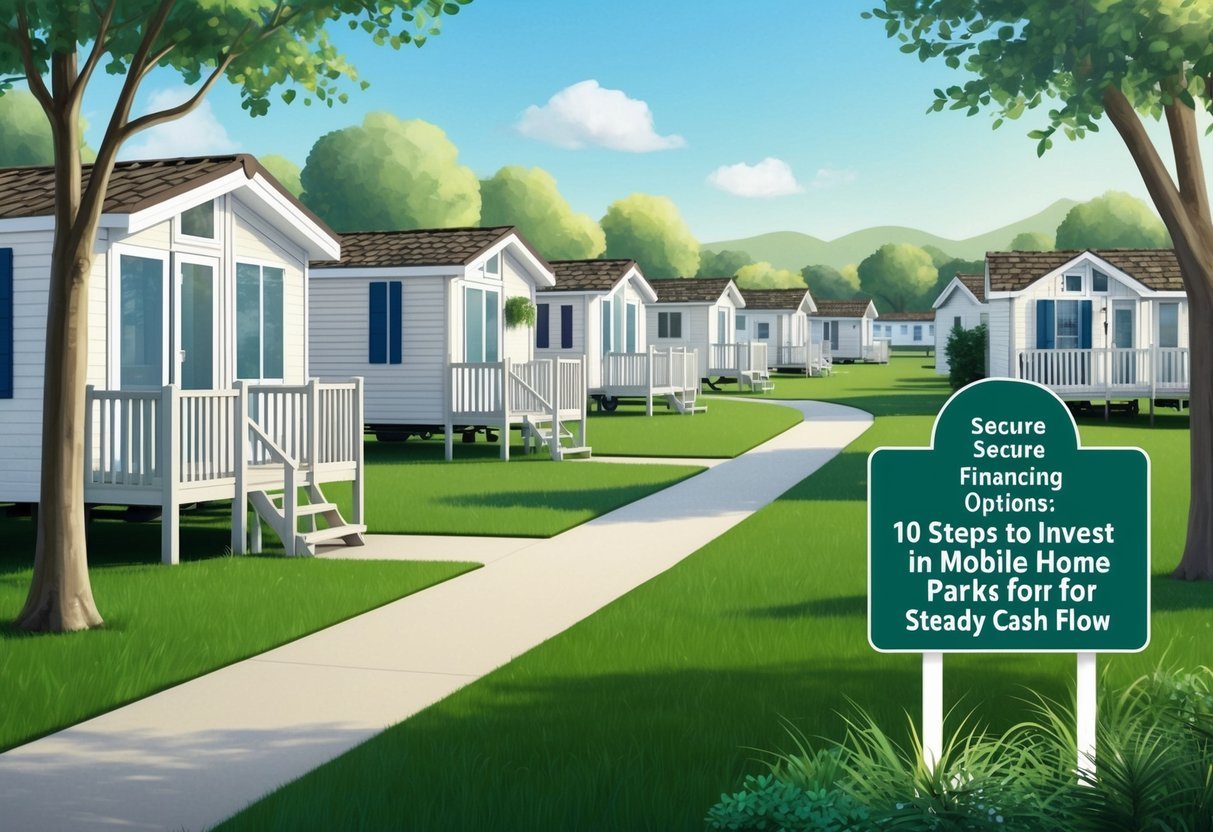
Securing financing for mobile home park investments is a crucial step in our journey toward financial success.
Our options vary significantly, depending on our credit profile, the location of the park, and its revenue potential.
Traditional bank loans are one way to go.
These usually require a significant down payment, often between 20% and 30%.
They offer stable repayment terms but can take time to secure.
For those of us looking for lower down payments, we may explore SBA loans.
These government-backed loans often provide favorable terms, especially if we qualify as small business owners.
We might also consider seller financing.
In some cases, the current owner may agree to finance part of the purchase, reducing our immediate out-of-pocket expense.
This can be particularly useful when dealing with smaller parks or private sales.
Private lenders or real estate investment groups offer alternative financing avenues.
They often have more flexible terms and may provide faster access to capital.
Nonetheless, they usually come with higher interest rates.
Investigating government programs might prove beneficial.
Various state and federal initiatives are available to support investors in manufactured housing, offering us incentives or subsidized loans.
Our final option could be raising private equity.
This involves partnering with other investors who contribute capital in exchange for a share of ownership.
This approach can spread risk and increase our purchasing power.
5) Inspect Rent Rates
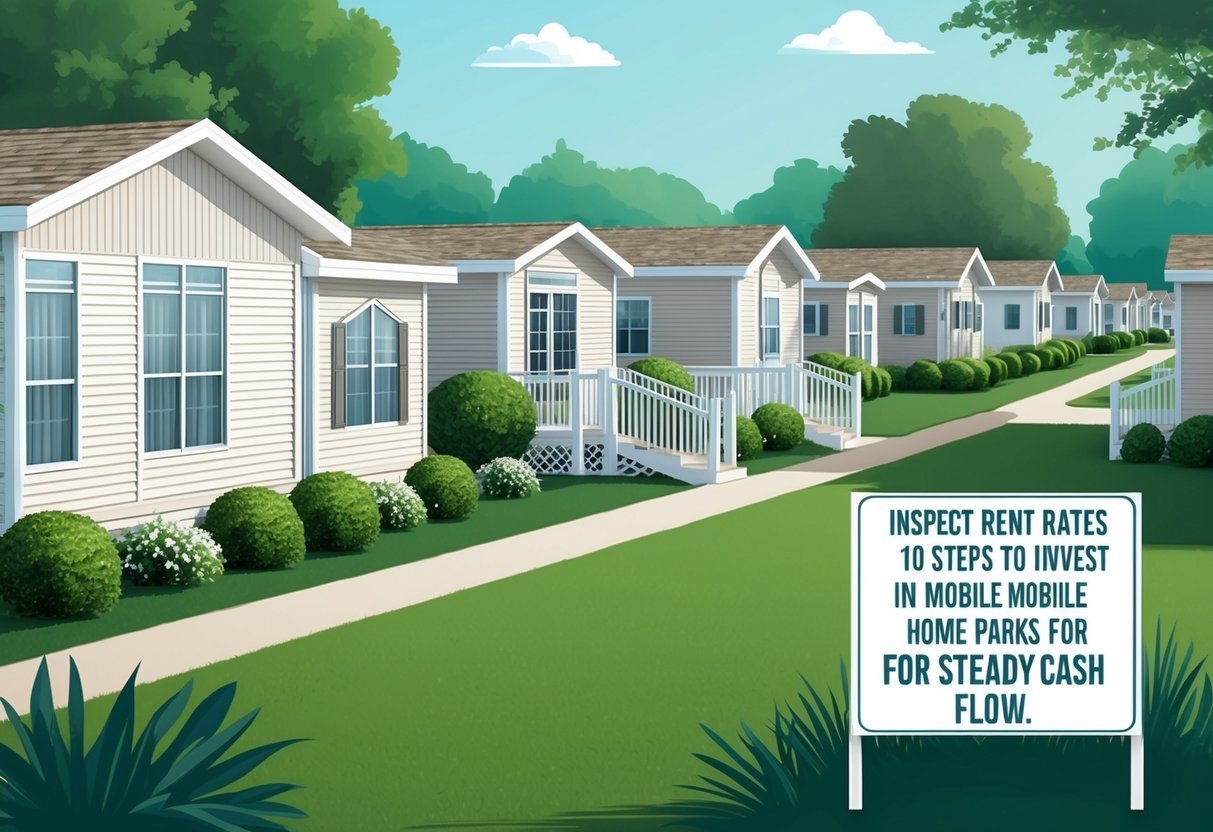
When evaluating a mobile home park investment, it is crucial for us to carefully analyze the current rent rates.
Comparing these rates to those of similar parks in the region can help us determine if they are competitive and sustainable.
This comparison provides insight into our potential income stream.
We need to examine any planned rent increases as well.
Understanding the park’s historical rent trends and any future projections helps us gauge long-term profitability.
Ensuring that rents align with the market while remaining affordable for tenants is essential to maintaining occupancy rates.
It’s also important to assess the park’s rental policies.
We should check for differences in rent rates between owner-owned and tenant-owned homes.
This helps us anticipate any possible adjustments needed to maximize revenue without compromising tenant satisfaction.
6) Consider Property Management

When investing in mobile home parks, property management plays a crucial role.
Effective management ensures smooth operations and maximizes tenant satisfaction.
It involves maintaining the property, handling tenant inquiries, and overseeing financial aspects like rent collection.
We should evaluate the capabilities of potential property managers thoroughly.
Experience in managing mobile home parks is vital, as these properties have unique requirements compared to other residential real estate.
A proficient manager can identify issues early and take timely action to resolve them.
Tenant relations are another critical aspect.
Good property management fosters a positive community atmosphere.
Addressing tenant concerns promptly and maintaining open communication can reduce turnover and improve occupancy rates.
Engaging with tenants and ensuring their needs are met can create a stable and harmonious park environment.
Choosing between hiring a property management company or self-managing depends on our expertise and resources.
A dedicated professional team may offer the advantage of established systems and experienced personnel.
If we opt for self-management, it’s essential to understand the demands and responsibilities involved.
Cost implications of property management should also be a consideration.
Management fees generally align with a percentage of the gross rents collected.
It’s important to factor this into our financial planning to ensure that the costs don’t exceed our budget or affect profitability.
7) Explore Tax Benefits
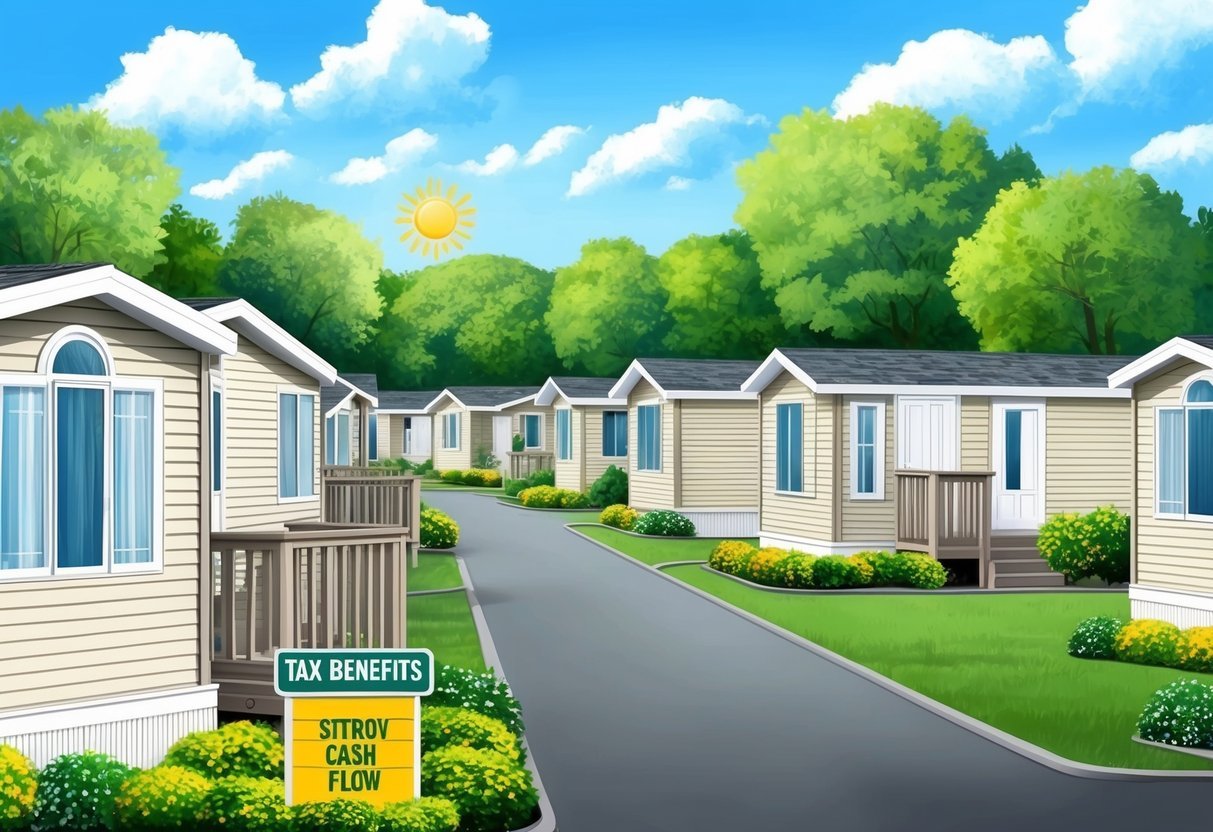
Investing in mobile home parks offers several tax benefits that can enhance our returns.
One of the primary advantages is depreciation, which allows us to reduce taxable income by accounting for property wear and tear.
Mobile home parks benefit from accelerated depreciation schedules compared to other real estate investments.
By reclassifying certain components of the park under a shorter lifespan, we can maximize our deduction potential.
Cost segregation studies can help us identify and categorize assets effectively, increasing depreciation deductions.
This strategy enables us to recover investments more quickly.
Another opportunity is the 1031 exchange, which allows deferral of capital gains taxes by reinvesting proceeds from selling one property into another “like-kind” property.
This can be an effective way for us to build wealth without significant tax burdens.
Additionally, income from mobile home parks typically benefits from favorable tax treatment.
Rental income, for instance, may be eligible for lower tax rates.
We should also consider state-specific tax incentives.
Some states offer tax reductions or credits for investments in affordable housing, further boosting our net returns.
By strategically leveraging these tax benefits, we can optimize our portfolio performance and achieve more consistent cash flow from our mobile home park investments.
8) Analyze Competition
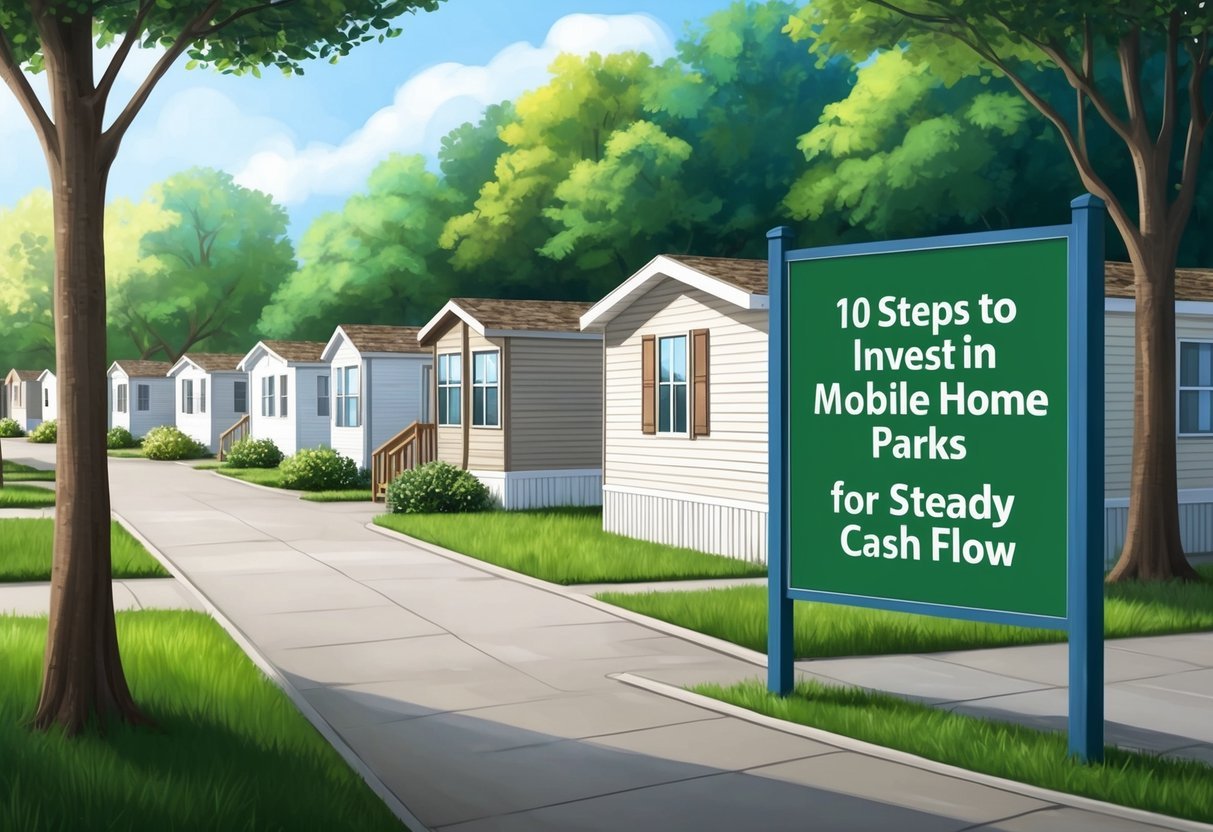
When we step into mobile home park investing, we need to understand the competition.
Understanding the competition is crucial.
It allows us to pinpoint what sets our investment opportunities apart from others in the market.
We need to identify who our competitors are, their market strategies, and what type of properties they are targeting.
Gathering data on the occupancy rates, rental prices, and amenities offered by competing parks is a good start.
By doing this, we can evaluate how our investment stands.
Analyzing these factors enables us to approach our business plan with precise, strategic positioning.
This helps us to effectively market our unique advantages, ensuring we attract and retain tenants.
We should also keep an eye on emerging trends in the industry.
Are there any shifts in tenant preferences or new regulations affecting the market? Staying informed allows us to anticipate changes and adapt our strategy.
This is important for keeping our investments competitive and attractive in a dynamic market setting.
Forging relationships with industry professionals can provide valuable insights.
Engaging with property managers and real estate agents can grant us inside knowledge on competition and market dynamics.
It also presents opportunities to learn about successful strategies and potential pitfalls to avoid.
9) Develop Marketing Strategies
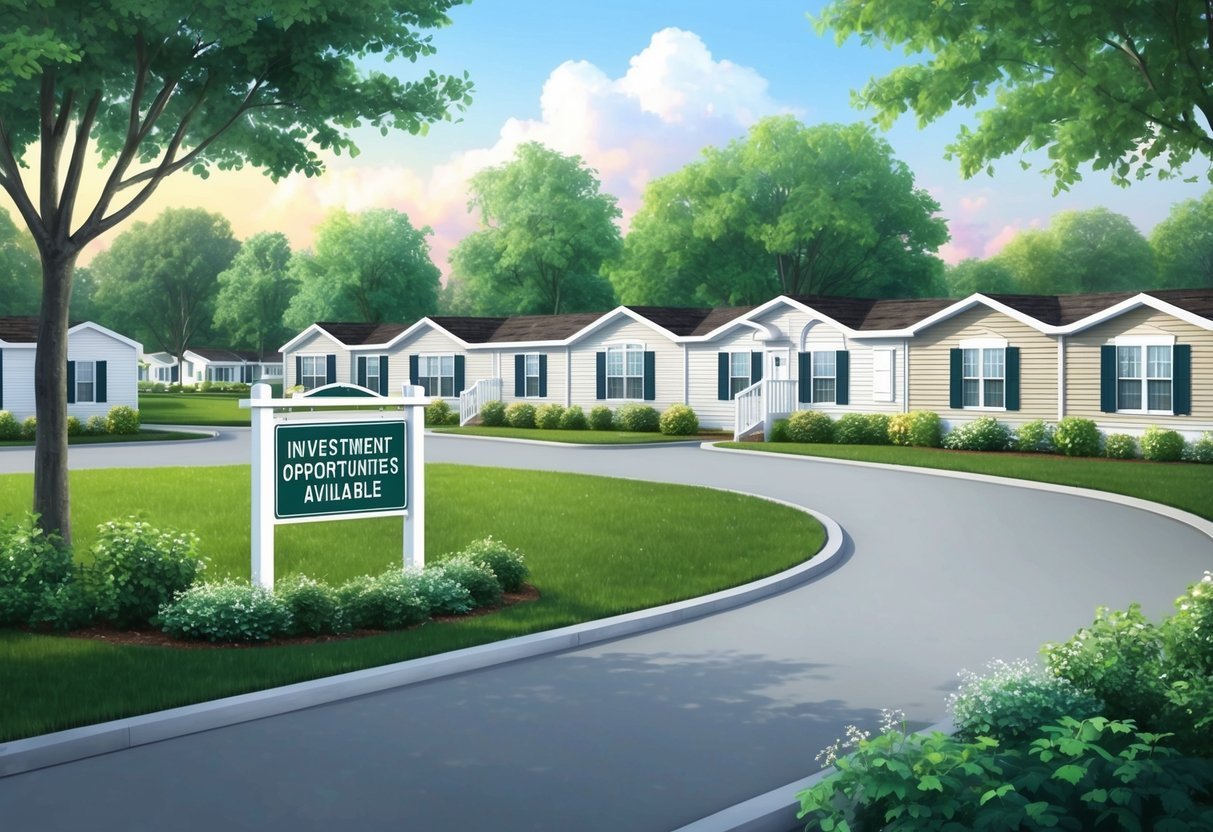
When planning to invest in mobile home parks, marketing plays a vital role in maintaining occupancy and ensuring steady cash flow.
Identifying our target audience is the foundational step.
Understanding their needs and preferences allows us to tailor our marketing efforts effectively.
Creating a strong online presence is essential in today’s digital age.
We should utilize social media platforms, a professional website, and online listings to reach potential tenants.
Ensuring our digital spaces are user-friendly and visually appealing can make a considerable difference.
Local partnerships can also enhance our marketing strategies.
Collaborating with local businesses and community organizations can increase visibility and build trust within the community.
Hosting community events is another way to engage potential residents and showcase our commitment to fostering a welcoming environment.
Advertising through traditional media channels, such as local newspapers and radio, continues to be a valuable option.
These methods reach demographics that might not be as active online but are still interested in affordable and stable housing options.
Referral programs can incentivize current residents to refer friends and family, helping to fill vacancies quickly.
Offering small rewards or discounts on rent can motivate residents to participate and spread positive word-of-mouth.
By leveraging a mix of digital and traditional marketing strategies, we can effectively promote our mobile home parks and attract a diverse range of potential tenants, ensuring our investment remains profitable and resilient.
10) Plan for Smaller Upgrades
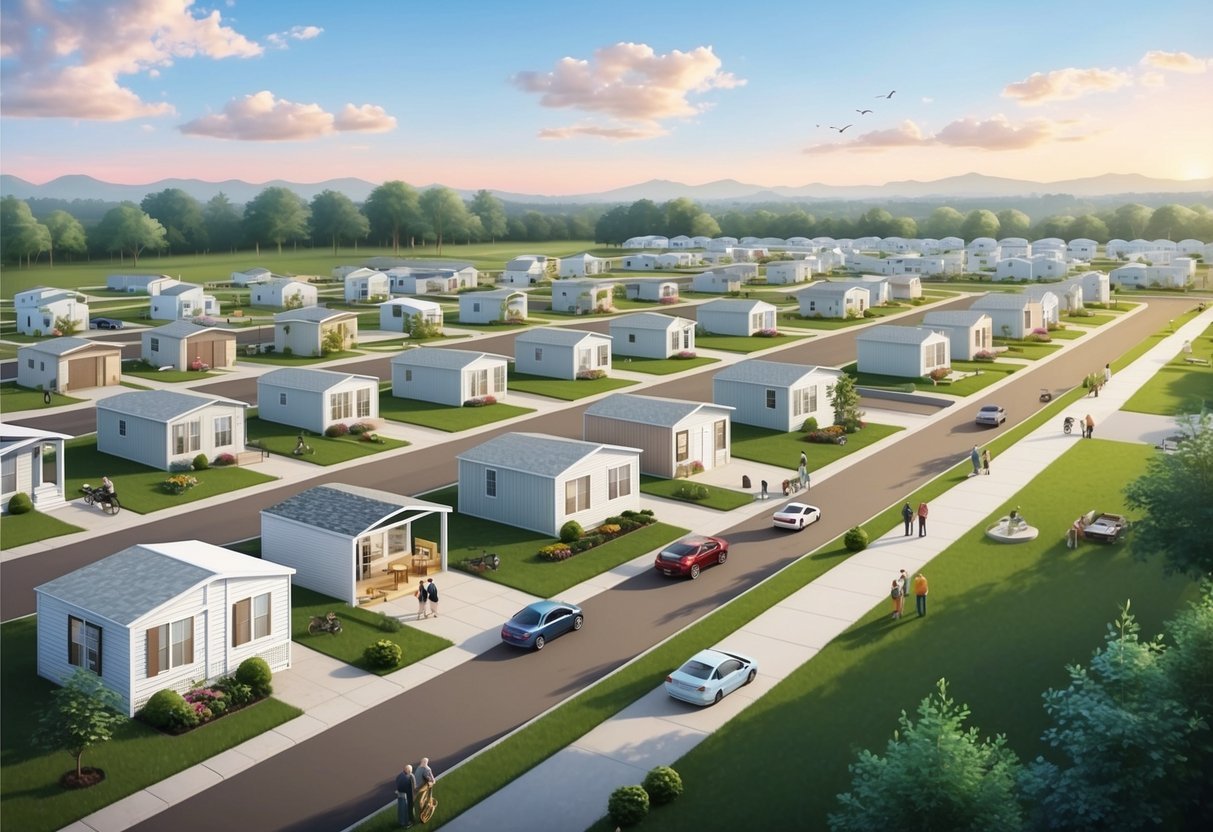
When investing in mobile home parks, it’s crucial for us to focus on planning smaller upgrades that enhance the property’s appeal and functionality.
These upgrades can add value without massive capital outlays.
Upgrading amenities such as lighting or pathway improvements can significantly elevate the park’s attractiveness.
We might consider adding communal areas or picnic tables to enhance community engagement.
Enhancing landscaping with low-maintenance plants offers an aesthetically pleasing environment that can attract more tenants.
Simple changes like these can make a big impact.
Improving common areas, such as clubhouses or playgrounds, can also add to the desirability of our park.
Repairs or enhancements to signage can boost the park’s visibility and contribute to a welcoming atmosphere.
By focusing on these smaller, manageable upgrades, we can steadily improve our mobile home park.
This approach allows us to maintain high occupancy and steady cash flow, creating a better living environment for our tenants.
Understanding Mobile Home Parks
In our exploration of mobile home parks, we examine their various types and consider current market trends.
By understanding the defining characteristics and demand, we can better evaluate potential investments.
Definition and Types of Mobile Home Parks
Mobile home parks are communities where land is leased for mobile or manufactured homes.
These parks can vary significantly in size and amenities.
Typically, they fall into categories like all-age parks or 55+ communities, each serving different demographics.
Some parks offer additional amenities such as clubhouses, swimming pools, or playgrounds, which can attract more residents.
The primary structure in these parks is the “pad,” a plot where each home is placed.
Recognizing these distinctions helps us identify which type of park aligns with our investment goals.
Market Demand and Market Trends
The demand for affordable housing has been steadily increasing, boosting the popularity of mobile home parks.
Many individuals and families are drawn to the cost-effective living solutions these parks offer.
As housing and rental prices rise, mobile home parks provide a stable and affordable alternative.
Current market trends indicate a growing interest in mobile home parks, partly due to their potential for steady cash flow and lower maintenance costs compared to other real estate investments.
Understanding this demand allows us to make informed decisions about investing in this sector.
By analyzing these trends, we can anticipate shifts in the market and adjust our strategies accordingly.
Financial Considerations for Investing in Mobile Home Parks
Investing in mobile home parks entails careful financial planning and analysis.
We should focus on understanding the initial investment costs and financing options, as well as the expected return on investment and cash flow potential.
Initial Investment and Financing Options
When considering an investment in mobile home parks, the initial cost can vary significantly.
Typically, acquiring a mobile home park involves purchasing a property that hosts multiple rental units, often between 10 to 100 units.
The cost per unit can be relatively low compared to other real estate types, often ranging from $10,000 to $12,000 per unit.
There are several financing options available.
Conventional loans from banks are common, but require a substantial down payment.
Another option is seller financing, allowing us to negotiate terms directly with the seller, which can provide more flexibility.
In some cases, investors may partner with syndicates, pooling resources to reduce personal capital outlay.
It’s essential to review the financial history of potential investments.
Analyzing profit and loss statements, cash flow projections, and existing lease agreements can provide insights into future performance.
Ultimately, understanding and planning for these costs will aid in making informed investment decisions.
Expected ROI and Cash Flow Analysis
A crucial aspect of investing in mobile home parks is examining the expected returns.
The potential for steady cash flow is significant due to relatively low operating costs and a consistent tenant base.
Revenue primarily comes from lot rents, supplemented by add-on services like utilities and maintenance.
Analyzing the ROI involves projecting future cash flows and assessing the rate of return relative to the investment size.
Factors such as location, park occupancy rates, and the local market demand heavily influence these projections.
In practice, mobile home parks can offer attractive cap rates, often higher than traditional residential or commercial properties.
Monitoring occupancy levels and rent collection histories will help us anticipate cash flow patterns.
Keeping an eye on maintenance costs and potential improvements is also important for maintaining profitability.
By meticulously evaluating these elements, we’ll be better positioned to maximize financial gains from our investments.
Regulatory and Legal Aspects
Navigating the regulatory and legal aspects of mobile home park investments is crucial.
Adhering to zoning laws ensures compliance, while understanding tenant rights helps maintain a harmonious relationship with residents.
Zoning Laws and Permits
Before investing, we must thoroughly investigate local zoning regulations and permit requirements.
Zoning laws dictate the use of land, affecting what kind of developments can take place in a given area.
Mobile home parks, in particular, face specific zoning categories that differ from traditional residential areas.
Understanding these laws enables us to determine whether a property is suitable for mobile home park development and operation.
Obtaining the necessary permits is also a vital part of the process.
It’s essential to verify all zoning compliance requirements with local authorities to avoid potential legal issues.
Failure to secure proper permits can result in fines or even forced closure of the park.
It’s prudent to collaborate with legal experts to navigate these complexities effectively.
Tenant Rights and Landlord Responsibilities
When managing mobile home parks, we need to be fully aware of tenant rights and our responsibilities as landlords.
Tenants usually own their homes but rent the land, making understanding the nuances of land tenancy laws critical.
We must ensure that rental agreements comply with local housing laws, so tenants’ rights, such as habitability and privacy, are protected.
As landlords, maintaining the property in good condition and addressing repair requests promptly is mandatory.
Regular communication helps in fostering positive landlord-tenant relationships.
Addressing these aspects lays the foundation for a stable and profitable investment while upholding ethical standards.
Frequently Asked Questions
In this section, we address inquiries regarding investing in mobile home parks.
We cover important factors to consider when selecting a park, performing due diligence, financing options, management strategies, risks involved, and legal aspects.
What factors should be considered when selecting a mobile home park for investment?
When selecting a mobile home park, we must analyze location, market trends, and zoning laws.
It’s crucial to evaluate the park’s condition and nearby amenities.
We also look into occupancy rates and the potential for population growth in the surrounding area.
How does one perform due diligence before purchasing a mobile home park?
Performing due diligence involves inspecting the park’s infrastructure, reviewing financial records, and verifying zoning compliance.
We should also assess the condition of utilities and common areas.
Speaking with current residents can provide insights into the operational environment of the park.
What are the common financing options available for investing in mobile home parks?
Investment in mobile home parks typically involves options such as bank loans, seller financing, and partnerships.
We can explore government-backed loans, as these may offer favorable terms.
Understanding the loan-to-value ratio will help in determining the appropriate financial strategy.
How can investors effectively manage a mobile home park to ensure optimal cash flow?
Effective management includes regular maintenance, efficient rent collection, and strategic vacancy management.
Engaging a reputable property management service can streamline operations.
We should establish transparent communication with residents to foster a positive community atmosphere, which directly influences retention rates and park profitability.
What are the potential risks and challenges associated with investing in mobile home parks?
Challenges include dealing with regulatory changes, fluctuating market demand, and infrastructure aging.
We must be prepared for unexpected maintenance costs and potential resident turnover.
Identifying risks early on allows us to create robust contingency plans.
What are the legal and regulatory considerations when operating a mobile home park?
Navigating legal and regulatory requirements involves understanding local and state zoning laws, health and safety standards, and tenant rights.
We must ensure compliance with fair housing laws.
Legal experts can provide clarity and prevent potential legal disputes.

